
I was going through the comments on my posts a while back, and I came across a doozy of a comment by user Maiden T. I'm not going to replicate the entire post here, but you can review the comment at the link provided. In summary, the commenter asserts that Silent Hill, as a series, was never about occultism, and that all the games were "repressed-memory morality tales". The first Silent Hill and "to an extent the third one" are the exceptions (according to Maiden T).
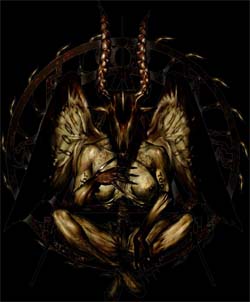
Totally unrelated image of a demon god...
My mind just about exploded when I read this comment, and I started typing up a response, only to realize that I had written a whole blog's worth of counter argument. So, I decided to just turn it into a new blog. I'll continue my series of analysis and interpretation articles about Silent Hill with a write-up about how the series is most definitely about occultism.
What is Silent Hill about?
I've already tackled two topics that I consider to be common myths about Silent Hill. The first was about the over-sexualization of Pyramid Head, and the second was about the realness of the Otherworld. Now I'll address one of the most fundamental misunderstandings about the series: what is it about?
The repressed-inner-demon myth
Probably the most core and fundamental myth about Silent Hill as a series is the continued propagation of the idea that the series (as a whole) is about characters dealing with repressed inner demons - typically a repressed memory of guilt over a perceived sin which they have committed. This idea is rooted in the popularity of Silent Hill 2. It is so pervasive, that the designers and producers of newer installments of the series embrace it, while dismissing the other critical elements of the other games' stories:
"[My favorite SH game is] Silent Hill 2. I didn’t really care for all the heavy occult based storyline in SH1 and 3. I felt SH2 had the best stand alone storyline, and provided the best atmosphere of all the SH games by far.
[...]
I find all the in’s and out’s of ‘The Order’ to be overly intricate and rather uninteresting, but that’s just my opinion."
- Devin Shatsky (producer, Shattered Memories, Downpour), in an interview with Hell's Descent (Nov 5, 2010).
The reason that Silent Hill 2's design was so successful (and unique within the series) is because SH2's excellent atmosphere was based around feelings of melancholy and depression rather than fear and threat. Exploring a character's personal guilt and depression works great when the entire game is designed around that central, unifying theme! It doesn't work quite so well when you try to combine it with a primal fear response. Depression is a downer that makes you slow, apathetic, and unresponsive. Fear is a stimulant that makes you anxious, alert, and active.
The other Silent Hill games were designed to be horror games intended to frighten the player, not to depress the player. It's like the difference between the depressingly-introspective poetry of Edgar Allen Poe versus a more visceral "monter flick" like Bram Stoker's Dracula. Dracula will leave you searching under your bed and in your closet for monsters that are going to eat you or suck your blood, but Poe will leave you sobbing into your pillow with the anxiety and paranoia that everything you love can be suddenly taken away from you via disease or random accident.
It seems that Silent Hill fans have a preference for the emotional and melancholy themes of Silent Hill 2, and have projected them onto the entire series. Yes, those themes are present in the other games (especially SH3 and SH4), but they are not the basis of the narratives. Yet that hasn't stopped fans from making statements like this:
"The original Silent Hill series wasn't really about the 'Occult', it was just the first and to an extent the third one that were [...] Silent Hill stories are repressed-memory morality tales, where the protagonist finds themselves in a nightmarish world haunted by creatures that represent their own psyche"
- Maiden T, in a comment on MegaBearsFan blog.
No. That was Silent Hill 2. The rest of the games were about occultism.
This is exactly the kind of mentality that has derailed the series and made it stale and boring. Every game since Origins has followed the same philosophy of trying to be about the character's secret repressed guilt, and it has made every one of those games feel derivative and predictable. Even if this cliche were perfectly executed every time (as it was in SH2), it would still get dull and tedious because we'd go into every game knowing that some deep-rooted guilt is going to be revealed at some point. There would be no mystery; no intrigue.
Original game plots, by Team Silent
So what were the actual plots of the Silent Hill games? Unless I am horribly misreading the games, the plots of the first four games (original development / design team) are as follows:
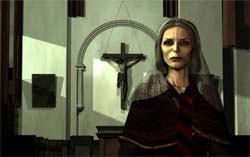
Occultism is center stage
Silent Hill [1] :
Harry Mason attempts to rescue his adopted daughter, Cheryl from a cult leader, Dahlia, who is attempting to perform a cult ritual using the 7-year old psychic girl to birth the cult's god.
The cult is definitely, unambiguously the primary focus of the narrative.
Furthermore, the game is not focused on Harry's psyche because the environments and monsters are drawn from the memories and personality of Alessa, who is accidentally projecting her chronic-pain-induced nightmares while trying to psychically seal off the town to protect the world from the influence of the god.
Silent Hill 2 :
James Sunderland must come to terms with the repressed memories and guilt associated with the death of his wife, and puts himself through his own, personal hell. The cult is definitely not the primary focus of this story. However, the cult is referenced numerous times, including:
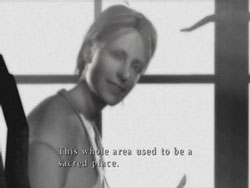
Silent Hill 2 is loaded with subtle references to the occult basis of the series.
- as an aesthetic basis for the game's primary antagonist: Red Pyramid Thing
- numerous references to religious persecution and spiritualism on the inscriptions of memorials scattered throughout town
- documents found within the game (most notably the one about Walter Sullivan - see (4.)) that reveal town history and lore
- cutscenes featuring Mary, in which she refers to the town as a "holy place"
- and the unlockable "rebirth" ending, in which a cult ritual is performed in order to resurrect James' dead wife
- and more...
Silent Hill 3 :
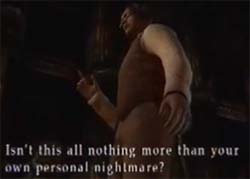
Vincent blames the decor on Claudia's imagination.
A new cult leader, Claudia, attempts to catalyze the birth of the cult's god within Heather by stimulating her with strong emotions such as fear, despair, and hatred, which, according to the cult's teachings, are the genesis of the god to begin with. Heather travels to the cult's church, learns about the cult's history, confronts the cult's leaders (Claudia and Vincent), and kills the cult's god in an act of revenge.
The cult is definitely the primary focus of the narrative.
On top of that, the creatures and environments are not exclusively drawn from Heather's psyche. They come from both Heather and Claudia's minds. Heather's psychology is not the focus of the narrative.
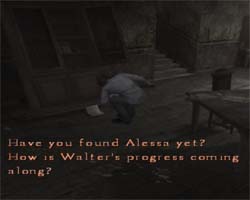
The 21 Sacrements plan was a backup or supplement to the Alessa plan.
Silent Hill 4: the Room :
A cult ritual turns the apartment of Henry Townshend into a sort of psychic nexus in which he can directly access the memories of the soul of Walter Sullivan, a deceased convicted murderer who was orphaned and adopted by an orphanage operated by the cult in order to be raised to perform the 21 Sacrements ritual in an attempt to birth the cult's god under the misguided impression that he will see his mother again.
Once again, this game's narrative is exclusively centered around a cult ritual (in fact, it includes more elaboration of the Alessa storyline).
Henry isn't a very expressive character, and we don't learn much about his life or history. All the locations and monsters in the game are derived from Walter's un-repressed memories - making the game absolutely not about Henry dealing with his own repressed memories.
Each game has unique themes, but the narrative focus of the series is on the cult
So of the first four games developed by the original creative team, three of them were primarily focused around the cult. Specifically, they were about various attempts by the cult to birth their god. The remaining (SH2) was a stand-alone, personal story, but it was still subtly imbued with cult elements. All of the games do have themes of personal loss and tragedy, but they are never the central focus of the narrative, nor does a characters' depression or guilt become a major factor - except in Silent Hill 2:
- In the first game, Harry is trying to find his lost daughter, who has re-combined with Alessa. There are several mentions that Harry's wife had died. That is the extent of the personal loss in this game. The predominant themes are anxiety, confusion, and claustraphobia, as well as conspiratorial undertones. There are no repressed memories or guilt of any kind.
- In the third game, Heather is seeking revenge for her murdered father. Hate and anger take center stage as predominant themes of this game, along with birth and faith. The fact that Heather remembers her past life as Alessa is solely a narrative device to catch the player up on the events of the first game - it is not a central focus or theme of the game. In fact, Heather reads about those events in a journal that Harry left, so it isn't entirely clear whether she actually remembers it happening, or she's just describing what Harry had written.
- The fourth game revolves around the villain's desire to reunite with the mother who abandoned him. Death, decay, neglect, and voyeurism are the most prominent themes of this game. Neither Henry nor Walter have repressed memories; although, Walter is the victim of brainwashing, and an avatar of the part of his mind that represents his "child-like innocence" does play a conflicting role.
Each game had a unique set of themes that tied to the characters, narrative, and gameplay. They weren't all based on the same motifs and cliches. They weren't all based on repressed guilt. And they weren't all themed around the main character's psyche. In fact, all the metaphor and symbolism in the games' monsters and creatures in all four games comes from the psyche of the villain (or perceived villain, in the case of Alessa up until you get to the Amusement Park and realize that Dahlia had been manipulating you). The only reason that Silent Hill 2 is themed around Jame's psyche (and Eddie's, and Angela's) is because they are all their own villains!
Other developers attempts at "official" fan-fiction
And when development was moved outside of Konami, both Homecoming and Origins retained significant cult influences on their narratives (i.e. the narratives were primarily about the cult):
Silent Hill Homecoming :
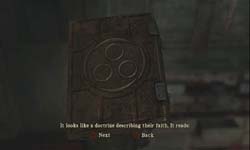
Shepherd's Glen Cult's "Book of Belief".
A tangential sect of the same cult from the first 4 games has relocated to Sheperd's Glen, where they must perform a cult ritual in which they sacrifice a child every generation in order to appease the cult gods so as not to incur their wrath.
This plot is definitely about the occult (albeight a tangential, schism group) - even Double Helix knew that the franchise was about occultism, and they didn't try to take that away.
Yes, they threw in repressed memory stuff, but that was secondary to the cult-based primary plot, as well as sloppy and contrived. This implies that the repressed memory elements of the plot might have been an afterthought or were forced onto the development team by the publisher.
Silent Hill Origins :
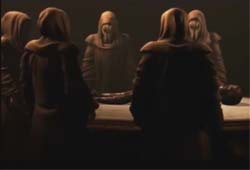
The cult gathers to decide what to do with Alessa.
A prequel to the first game, in which Travis Grady rescues Alessa from a cult ritual only to be made into an unwilling partcipant in the cult's attempt to birth the cult god. Travis seals the cult god into the Flauros so that Alessa can split her soul and trigger the events of the first game.
This game is just as unambiguously about the cult as the first game is.
Again, this game includes repressed memory stuff, but that feels like filler material for a the primary narrative's butchering of Silent Hill's occult backstory.
Still a majority focus on the cult
At this point, four out of six Silent Hill games had a plot that directly involved a cult trying to birth its god, and one more game (Homecoming) was about a cult sacrificing children in order to pacify that same god. That's five out of six Silent Hill games (or 83% of the series, if you don't like fractions) that are directly about a cult and their worship of a god. An overwhelming majority of the series, at this point, is focused around occultism, and the specific cult that it is about is the unifying thread that ties all the games in the series together. In fact, the cult is more prominent than the titular town of Silent Hill at this point! A majority of Silent Hill 3, Silent Hill 4, and Homecoming do not even take place in Silent Hill.
The creators of Homecoming and Origins also recognized the themes of personal (i.e. familial) loss and tragedy, and incorporated those into their games. In Origins, Travis must face the memory of his mother attempting to kill him in some sort of postpartum depression. In Homecoming, Alex is searching for his lost brother in an attempt to combine the major premises of both of the first two Silent Hill games.
Only Downpour and Shattered Memories did not involve themselves in occultism, and they ended up being thematically the worst games in the series, and felt the most disconnected from the rest of the franchise. These games also maintained the family tragedy themes, but the natures of the various endings erode these themes. Can we really sympathize with Cheryl's loss in Shattered Memories if her dad ends up being a neglectful, womanizing alcoholic? Similarly, can we sympathize with Murphy if he ends up being a remorseless child-murderer? More confusing yet: are we supposed to?
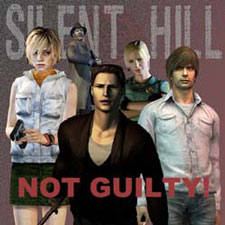
Most characters in the first four games are not overwhelmed with guilt.
RE: personal guilt in Silent Hill
Prior to Homecoming, only Silent Hill 2 was about the protagonists' guilt. Harry was not guilty of anything except being a devoted dad. Heather was not guilty of anything except being a reincarnation of Alessa (who was not guilty of anything except for trying to stop the god's birth and destruction of the world). Henry was not guilty of anything except for signing a lease to the wrong apartment (and maybe being a peeping Tom).
So only one out of four original games had anything to do with a protagonist confronting his or her own inner guilt.
Furthermore, only Silent Hill 2 had repressed memories as a predominant theme. Yes, Heather had repressed memories of her past life as Alessa in SH3, but that is incidental, and not the driving force of the narrative. Recalling memories of her past life was just a way for the designers to give the player a recap of the first game, which could have been handled just as easily through reading journal entries from Harry.
So repressed memories is only even a factor in two of the original four games, and is only a major component of one of those narratives.
So to claim that a plot device that is only used in 1/4th of the series (and not even the first entry in that series) is "what the series was always about" is empirically and unequivocally false.
Yet, by the time of Origins and Homecoming, amnesia and repressed guilt had become a secondary element of the plot in an attempt to recreate the success of Silent Hill 2. And by Shattered Memories and Downpour, it had become the only plot device. Shattered Memories had reduced the narrative to a therapy session, and Downpour turned the town into some kind of "limbo" from which a character cannot escape unless he or she confronts his or her inner demons.
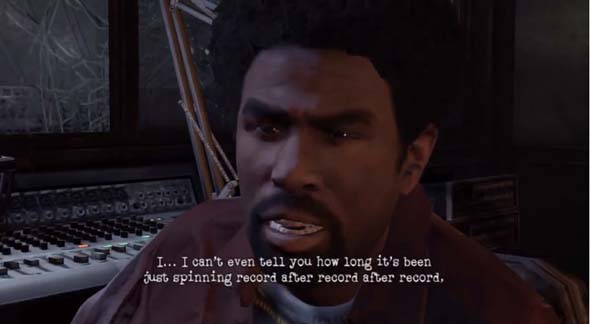
Spinning records for eternity in limbo is the punishment the town has bestowed on the D.J..
What is he guilty of? Assuming he even exists...
Furthermore, the town in Downpour isn't even behaving as it did in SH2 anymore. In SH2, the world reshapes reality based on the mental state of one or more of its occupants as a sort of organic interaction between the character's mind and the supernatural influences of the region; whereas, in Downpour, there is no reality, and the world is operating via apparently consciously-designed and deliberately-executed rules. Suddenly, the town isn't reacting to [and giving physical form to] the characters' own desires to punish themselves; it is proactively executing its own will to punish them (and in the case of several Downpour endings: for sins that the character didn't even commit!).
Is this shift from reactive punishment to proactive punishment an intentional narrative decision by the designers at Vatra? Are they trying to tell us that the rules of the game's world have changed? Or did they (and the producers at Konami) just not understand the earlier games? Considering how badly they blundered Downpour's story in general, I'm leaning towards the latter. But even if that was the intent, then it would clearly represent a change in the behavior of the town; it shouldn't be retroactively applied to the previous games in the series.
The success of Silent Hill 2 (and of James as a character) is that we sympathize with him because the decisions he had to make were very difficult ones. His actions lie very thoroughly in a moral gray area that make James neither a saint nor a villain. He is clearly a very tormented individual, and his personal history is consistent in any replay of the game. So every player sees the same sympathetic character, and the only thing that changes is how he handles the revelation - not the content of the revelation itself.
A fundamental difference in Silent Hill's behavior between Downpour and Silent Hill 2:
[LEFT] Murphy and D.J. Ricks are being punished by Silent Hill in Downpour (what are Ricks' sins?);
[RIGHT] whereas, in Silent Hill 2, Silent Hill was merely making tangible James' own desire to punish himself.
Travis' story probably could have been a much better and more tragic tale if it had been the exclusive focus of the game and if the designers had a little more talent and consistent vision. Origins is quite literally two games in one: a fallacious retelling of the first game's backstory, and a tale of personal tragedy. The two are completely unrelated, but without the cult half of the story, the game loses its connection to the Silent Hill franchise. Homecoming's writers did a much better job of integrating the personal tragedy into the cult-based story, but the story that was written is just bad.
Downpour's endings just didn't make sense. Depending on which one you get, it's impossible to sympathize with Murphy, or (in some cases) even know what the heck was going on.
This is what the "repressed-guilt" myth has done to the series. This obsession with rebranding the entire Silent Hill series based solely on Silent Hill 2 is condemning the franchise to a slow and painful (and tedious) death. The designers of new games are constrained to this tired cliche and are forced to actively avoid exploring new and interesting elements of the setting and lore out of a fear of deviating too far from Silent Hill 2's "formula of success" or alienating fans who are stuck with the impression of the series being about guilt and memory-repression. They completely ignore the merits of the themes, styles, and concepts explored in Silent Hill [1] and 3, despite the fact that those games were also critically and commercially successful, and they fail to realize why Silent Hill 2 was successful to begin with.

There are still plenty of reasons to revisit the setting of Silent Hill.
Moving forward with the series
However, just because the series' history has been about a specific cult group, doesn't mean that the series has to continue down those lines. But instead of going off on completely unrelated tangents, why not first try to explore the elements of the series' mythos and lore which have been established, but not been explored? The first four games are littered with details about hundreds of years of town history, including mysteries, scandals, and corruption. Those could be ripe concepts for new games moving forward.
While I would prefer that future games retain some thematic and narrative connections to the older games, if future developers make great stand-alone games that are named Silent Hill, then I won't complain [as much]. I'd still rather not see Silent Hill turn into the "Twilight Zone" of video games. If Konami wants to make a series of stand-alone horror games about personal guilt and characters that have been dead all along, then why do they have to put the "Silent Hill" label on it? Just let Silent Hill be what it's always been, and release new games with new titles. I know you're terrified of releasing new IP that doesn't have any name recognition, but if you make good games, then people will buy them, and you'll have a new name to cash-in on! If you keep going down this same path, then eventually the name "Silent Hill" will be synonymous with "crappy, shallow, un-scary horror game". And when that happens (if it hasn't already), then the name-recognition will come back and bite your future sales figures in the ass, and there won't be any fans left.